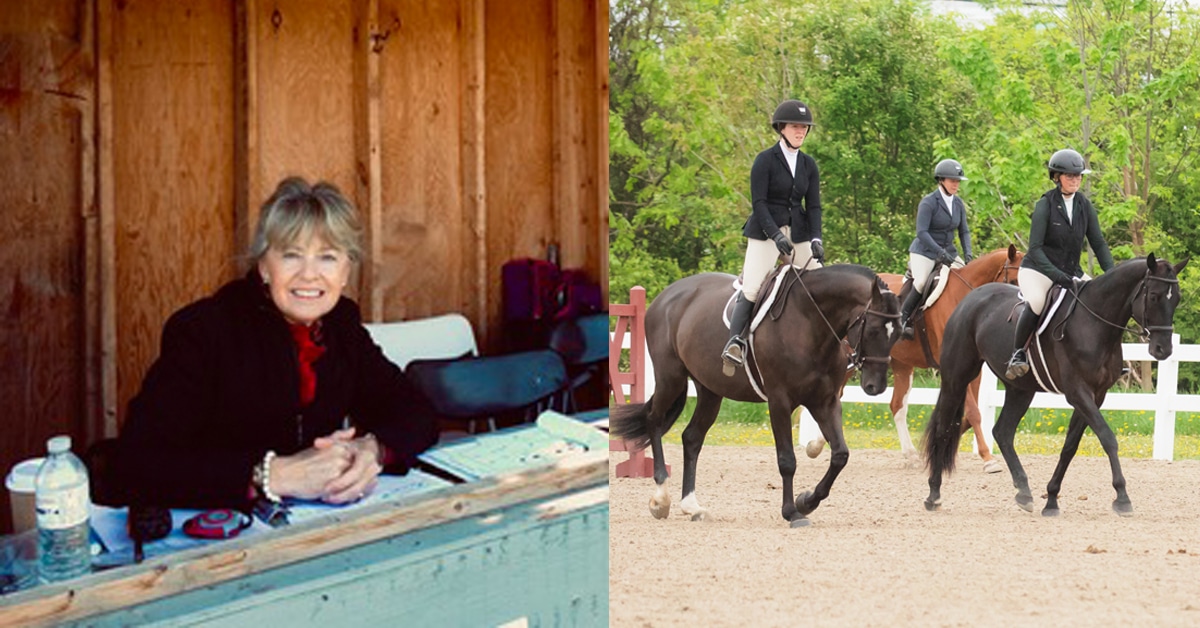At age 74, Jessica is putting the same effort into working with para-equestrians as she did during her long involvement with international-level, able-bodied riders.
The energetic Jessica rides every day at her Blue Hill Farm in Pennsylvania, helping train horses for para riders as they set their sights on next year’s Alltech FEI World Equestrian Games.
Jessica, whose daughter, Missy, coaches the U.S. para-equestrian team, is an expert planner of what to do leading up to big competitions.
The 2009 winner of the U.S. Equestrian Federation’s Lifetime Achievement Award got personally involved with para-equestrian through James Dwyer, an Irish rider who aspired to make the Paralympics. James, who lost his lower right leg to cancer, lived at the 75-acre Blue Hill for eight years.
“We had a goal; our goal was to make the Irish team,” said Jessica, who threw herself wholeheartedly into his quest. Not only did she and James achieve that goal, he also contributed to Ireland’s 2012 team bronze.
“I would not have been able to do it without her,” says James firmly.
“She basically took me in like a son and put as much work into me and the horse as I did into my riding.”
“Anybody who knows Jessica knows she is very determined and very focused. I don’t know if everybody sees this part of her, but she’s also a very loving and generous woman as well,” he commented.
Jessica’s involvement with U.S. dressage has been on every level. She rode in three Olympics over more than a quarter-century; debuting in the 1960 Rome Games, followed by Tokyo four years later and then Seoul in 1988.
During her initial run as chef d’equipe from 1990-2004 (she returned on an interim basis in 2009), the U.S. team won the bronze medal in every Olympics, and a fistful of Pan American and WEG medals as well, including an unprecedented silver in the 2002 WEG.
She did whatever she could to help the team, going far beyond just speaking up for the riders in meetings at international competitions.
“I’m never too sorry about talking to the judges,” Jessica chuckled.
Asked to name the favorite moments of her chef d’equipe career, she replied, “Getting that first bronze medal in Barcelona (1992 Olympics) was really wonderful and watching Steffen Peters on Ravel at Aachen (in 2009).”
“Several of us won classes at Aachen but we never won all three classes. That was a total thrill, to be there and have Steffen do it,” she remembers.
Although she is no longer involved day-to-day with the sport, after decades of serving on the country’s high-performance committee, she keeps a close eye on the team.
Speaking frankly, as she always does, Jessica expressed disappointment about the transition of international responsibilities to the U.S. Equestrian Federation after the U.S. Equestrian Team became strictly a fundraising foundation. When it was all taken over by the USEF, I thought “There are too many factions there and it’s very hard to keep the impetus and strength going toward our international teams if you have Morgans and western and who knows what-all supposedly on equal footing,” she explained.
“I think a lot of our drive and impetus has faltered a little.”
In the USET days, she said, “We fine-tuned that whole operation so that we had it down to a science as to how many places we should be before the Olympics as a team, so we were showing the judges we could stay right up with the Europeans.”
Although she can no longer judge internationally after reaching the mandatory retirement age of 70, Jessica is still eligible to judge nationally, but chooses not to.
“I have more fun coaching and helping people go to the shows,” explained Jessica, whose lesson calendar includes able-bodied riders as well as four para-equestrians.
Robert Dover, the new U.S. team dressage chef d’equipe, was Jessica’s teammate on the 1988 Olympic squad, and her friend for longer than that.
“She truly has been a gift to our sport and to me personally,” said Robert. “She is an amazing rider, trainer, coach, chef and human being.”
The Latest









